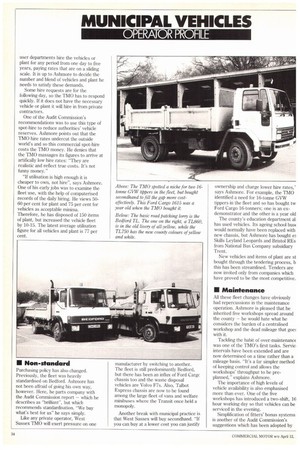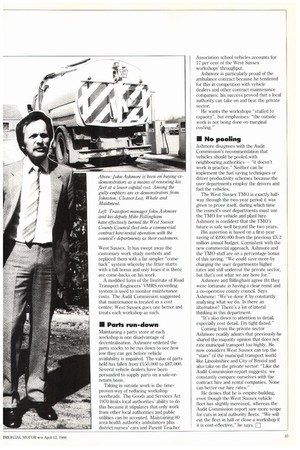MUNICIPAL VEHICLES
Page 42

Page 43

If you've noticed an error in this article please click here to report it so we can fix it.
OPERATOR PROFILE
user departments hire the vehicles or plant for any period from one day to five years, paying rates that are on a sliding scale. It is up to Ashmore to decide the number and blend of vehicles and plant he needs to satisfy these demands.
Some hire requests are for the following day, so the TM() has to respond quickly. If it does not have the necessary vehicle or plant it will hire in from private contractors.
One of the Audit Commission's recommendations was to use this type of spot-hire to reduce authorities' vehicle reserves. Ashmore points out that the TMO hire rates undercut the outside world's and so this commercial spot-hire costs the TMO money. He denies that the TMO massages its figures to arrive at artifically low hire rates: "They are realistic and reflect true costs. It's not funny money."
"If utilisation is high enough it is cheaper to own, not hire", says Ashmore. One of his early jobs was to examine the fleet use, with the help of computerised records of the daily hiring. He views 5060 per cent for plant and 75 per cent for vehicles as acceptable minima.
Therefore, he has disposed of 150 items of plant, but increased the vehicle fleet by 10-15. The latest average utilisation figure for all vehicles and plant is 77 per cent. ownership and charge lower hire rates,' says Ashmore. For example, the TMO identified a need for 16-tonne GVW tippers in the fleet and so has bought tw Ford Cargo 16-tanners; one is an exdemonstrator and the other is a year old The county's education department al: has used vehicles. Its ageing school bus( would normally have been replaced with new chassis, but Ashmore has bought e) Skills Leyland Leopards and Bristol REs from National Bus Company subsidiary Trent.
New vehicles and items of plant are st bought through the tendering process, b this has been streamlined. Tenders are now invited only from companies which have proved to be the most competitive.
• Maintenance
All these fleet changes have obviously had repercussions in the maintenance operation. Ashmore is pleased that he inherited five workshops spread around the county — he would hate what he considers the burden of a centralised workshop and the dead mileage that goes with it.
Tackling the habit of over-maintenanc€ was one of the TMO's first tasks. Servio intervals have been extended and are now determined on a time rather than a mileage basis. "It's a far simpler method of keeping control and allows the workshops' throughput to be preplanned," explains Ashmore.
The importance of high levels of vehicle availability is also emphasised more than ever. One of the five workshops has introduced a two-shift, 16 hour working day so that vehicles can be serviced in the evening.
Simplification of fitters' bonus systems is another of the Audit Commission's suggestions which has been adopted by West Sussex. It has swept away the customary work study methods and replaced them with a far simpler "comeback" system whereby the fitter starts with a full bonus and only loses it is there are come-backs on his work.
A modified form of the Institute of Road Transport Engineers' VMRS recording system is used to monitor maintenance costs. The Audit Commission suggested that maintenance is treated as a cost centre; West Sussex goes one better and treats each workshop as such.
• Parts run-down
Maintaining a parts store at each workshop is one disadvantage of decentralisation. Ashmore ordered the parts stocks to be run down to see how low they can get before vehicle availability is impaired. The value of parts held has fallen from £150,000 to 287,000. Several vehicle dealers have been persuaded to supply parts on a sale-orreturn basis.
Taking in outside work is the timeproven way of reducing workshop overheads. The Goods and Services Act 1970 limits local authorities' ability to do this because it stipulates that only work from other local authorities and public utilities can be accepted. Maintaining 80 area health authority ambulances plus district nurses' cars and Parent 'Teacher Association school vehicles accounts for 17 per cent of the West Sussex workshops' throughput.
Ashmore is particularly proud of the ambulance contract because he tendered for this in competition with vehicle dealers and other contract maintenance companies; his success proved that a local authority can take on and beat the private sector.
He wants the workshops ''stuffed to capacity", but emphasises: "the outside work is not being done on marginal costing."
• No pooling
Ashmore disagrees with the Audit Commission's recommendation that vehicles should be pooled with neighbouring authorities — "it doesn't work in practice." Neither can he implement the fuel saving techniques or driver productivity schemes because the user departments employ the drivers and fuel the vehicles.
The West Sussex TMO is exactly halfway through the two-year period it was given to prove itself, during which time the council's user departments must use the TMO for vehicle and plant hire. Ashmore is confident that the TMO's future is safe well beyond the two years.
His assertion is based on a first-year saving of 2200,000 from the previous 2.3.2 million annual budget. Consistent with the new commercial approach. Ashmore and the TMO staff are on a percentage bonus of this saving. "We could save more by charging the user departments higher rates and still undercut the private sector, but that's not what we are here for."
Ashmore and Billingham agree tht they were fortunate in having a clear remit and a co-operative county council. Says Ashmore: "We've done it by constantly analysing what we do. Is there an alternative? There's a lot of lateral thinking in this department.
"It's also down to attention to detail, especially cost detail. I'm tight-fisted."
Coming from the private sector Ashmore readily admits that previously he shared the majority opinion that does not rate municipal transport too highly. He now considers West Sussex can top the "stars" of the municipal transport world like Lincolnshire and City of Bristol and also take on the private sector: "Like the Audit Commission report suggests, we constantly compare ourselves with the contract hire and rental companies. None can better our hire rates."
He denies that he is empire-building, even though the West Sussex vehicle fleet has slightly increased, whereas the Audit Commission report saw more scope for cuts in local authority fleets. "We will cut the fleet in half or close a workshop if it is cost-effective," he says.






























































